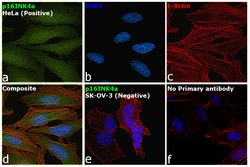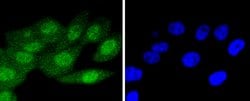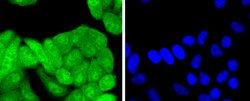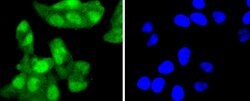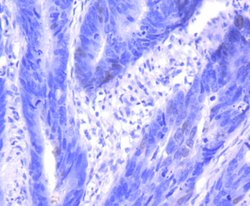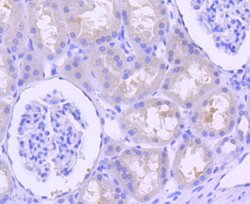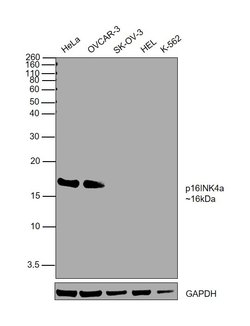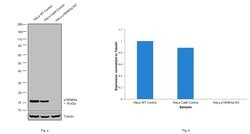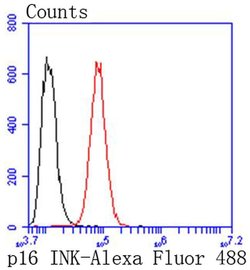Learn More
Invitrogen™ p16INK4a Recombinant Rabbit Monoclonal Antibody (SU0702)
Rabbit Recombinant Monoclonal Antibody
Supplier: Invitrogen™ MA532133
Description
Recombinant rabbit monoclonal antibodies are produced using in vitro expression systems. The expression systems are developed by cloning in the specific antibody DNA sequences from immunoreactive rabbits. Then, individual clones are screened to select the best candidates for production. The advantages of using recombinant rabbit monoclonal antibodies include: better specificity and sensitivity, lot-to-lot consistency, animal origin-free formulations, and broader immunoreactivity to diverse targets due to larger rabbit immune repertoire.
This gene generates several transcript variants which differ in their first exons. At least three alternatively spliced variants encoding distinct proteins have been reported, two of which encode structurally related isoforms known to function as inhibitors of CDK4 kinase. The remaining transcript includes an alternate first exon located 20 Kb upstream of the remainder of the gene; this transcript contains an alternate open reading frame (ARF) that specifies a protein which is structurally unrelated to the products of the other variants. This ARF product functions as a stabilizer of the tumor suppressor protein p53 as it can interact with, and sequester, the E3 ubiquitin-protein ligase MDM2, a protein responsible for the degradation of p53. In spite of the structural and functional differences, the CDK inhibitor isoforms and the ARF product encoded by this gene, through the regulatory roles of CDK4 and p53 in cell cycle G1 progression, share a common functionality in cell cycle G1 control. This gene is frequently mutated or deleted in a wide variety of tumors, and is known to be an important tumor suppressor gene.
Specifications
| p16INK4a | |
| Recombinant Monoclonal | |
| 1 mg/mL | |
| TBS with 0.05% BSA, 40% Glycerol and 0.05% sodium azide; pH 7.4 | |
| P42771, Q8N726 | |
| CDKN2A | |
| Synthetic peptide within Human p16INK4A aa 107-156. | |
| 100 μL | |
| Primary | |
| Human | |
| Antibody | |
| IgG |
| Flow Cytometry, Immunohistochemistry (Paraffin), Western Blot, Immunocytochemistry, Western Blot | |
| SU0702 | |
| Unconjugated | |
| CDKN2A | |
| Alternative reading frame; Arf; ARF-INK4a; CDK4 inhibitor p16 INK4; CDK4 inhibitor p16-INK4; CDK4I; CDKN2; Cdkn2a; cdkn2a {ECO:0000312; cell cycle inhibitor; cell cycle negative regulator beta; cell cycle regulator; CMM2; Cyclin dependent kinase 4 inhibitor A; cyclin dependent kinase inhibitor 2A; Cyclin dependent kinase inhibitor 2A (p16, inhibits CDK4); cyclin-dependent kinase 4 inhibitor A; Cyclin-dependent kinase inhibitor 2A; cyclin-dependent kinase inhibitor 2A (melanoma, p16, inhibits CDK4); cyclin-dependent kinase inhibitor 2A (p16, inhibits CDK4); cyclin-dependent kinase inhibitor 2a p16Ink4a; cyclin-dependent kinase inhibitor 2a p19Arf; cyclin-dependent kinase inhibitor 2A, isoform 1; cyclin-dependent kinase inhibitor 2A, isoform 2; cyclin-dependent kinase inhibitor 2A, isoform 3; cyclin-dependent kinase inhibitor 2A, isoforms 1/2; cyclin-dependent kinase inhibitor protein; EMBL:AAL76336.1, ECO:0000312; EMBL:AAL76338.1, ECO:0000312; HGNC:1787; inhibits CDK4; INK4; INK4A; Ink4a/Arf; INK4a-ARF; isoforms 1/2/3; Melanoma p16 inhibits CDK4; mitochondrial smARF; MLM; MTS1; MTS-1; Multiple tumor suppressor 1; P14; P14 P16; P14ARF; p16; p16(INK4a); p16Cdkn2a; P16INK4; p16-INK4; p16INK4a; p16-INK4a; P19; P19 TP16; p19>ARF>; P19ARF; Pctr1; RGD:2323}; TP16; Tumor suppressor ARF | |
| Rabbit | |
| Protein A | |
| RUO | |
| 1029 | |
| Store at 4°C short term. For long term storage, store at -20°C, avoiding freeze/thaw cycles. | |
| Liquid |
Your input is important to us. Please complete this form to provide feedback related to the content on this product.
